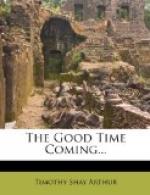“Yes—how often do we hear that remarked! It is the preacher’s theme on each recurring Sabbath,” said Mrs. Markland, in an abstracted way. “How often have words of similar import passed my own lips, when I spoke as a mentor, and vainly thought my own heart was not wedded to the world and the good things it offers for our enjoyment!”
“If we are so wedded,” said Mrs. Willet, in her earnest, gentle way, “is not that a loving Providence which helps us to a knowledge of the truth, even though the lesson prove a hard one to learn—nay, even if it be acquired under the rod of a stern master?”
“Oh, yes, yes!” said Mrs. Markland, unhesitatingly.
“It is undoubtedly true,” said Mrs. Willet, “that all things of natural life are arranged, under Providence, with a special view to the formation and development within us of spiritual life, or the orderly and true lives of our spirits. We are not born into this world merely to eat, drink, and enjoy sensual and corporeal pleasures alone. This is clear to any mind on the slightest reflection. The pleasures of a refined taste, as that of music and art, are of a higher and more enduring character than these; and of science and knowledge, still more enduring. Yet not for these, as the highest development of our lives, were we born. Taste, science, knowledge, even intelligence, to which science and knowledge open the door, leave us still short of our high destiny. The Temple of Wisdom is yet to be penetrated.”
“Science, knowledge, intelligence, wisdom!” said Mrs. Markland, speaking slowly and thoughtfully. “What a beautiful and orderly series! First we must learn the dead formulas.”
“Yes, the lifeless scientifics, if they may so be called, must first be grounded in the memory. Arrangement and discrimination follow. One fact or truth is compared with another, and the mind thus comes to know, or has knowledge. Mere facts in the mind are lifeless without thought. Thought broods over dead science in the external memory, and knowledge is born.”
“How clear! How beautiful!” ejaculated Mrs. Markland.
“But knowledge is little more than a collection of materials, well arranged; intelligence builds the house.”
“And wisdom is the inhabitant,” said Mrs. Markland, whose quick perceptions were running in advance.
“Yes—all that preceded was for the sake of the inhabitant. Science is first; then knowledge, then intelligence—but all is for the sake of wisdom.”
“Wisdom—wisdom.” Mrs. Markland mused again.
“What is wisdom?”
“Angelic life,” said Mrs. Willet. “One who has thought and written much on heavenly themes, says, ’Intelligence and wisdom make an angel.’”
Mrs. Markland sighed, but did not answer. Some flitting thought seemed momentarily to have shadowed her spirit.
“To be truly wise is to be truly good,” said Mrs. Willet. “We think of angels as the wisest and best of beings, do we not?”




